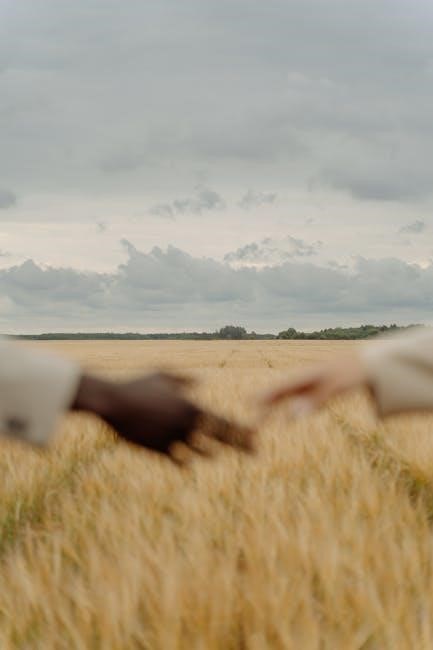Abraham Maslow’s posthumous work explores human nature’s depths, blending science and philosophy․ It delves into self-actualization, peak experiences, and spirituality, offering a holistic view of human potential․

Abraham Maslow’s Contributions to Psychology
Abraham Maslow, a pioneer in humanistic psychology, revolutionized the field with his groundbreaking theories, particularly the hierarchy of needs and self-actualization․ His work emphasized the study of healthy individuals and their potential, shifting focus from pathology to human growth; In The Farther Reaches of Human Nature, Maslow extended his earlier ideas, integrating science and philosophy to explore complexities like creativity, synergy, and spirituality․ His concepts of “Being-Realm” and “Deficiency-Realm” introduced a new perspective on human motivation and fulfillment․ Maslow’s contributions not only expanded psychological theory but also influenced education, business, and spirituality, offering a holistic understanding of human nature․ His emphasis on peak experiences and transcendence bridged psychology with mysticism, making his work timeless and universally relevant․

The Integration of Science and Philosophy in Understanding Human Nature
Maslow’s work seamlessly blends empirical science with philosophical inquiry, offering a unique approach to understanding human nature․ By combining scientific methodologies with philosophical aesthetics, he explores themes like biology, synergy, and creativity, providing a holistic perspective․ This integration allows for a deeper exploration of human potential, bridging the gap between objective observation and subjective experience․ Maslow’s approach challenges traditional psychological frameworks by incorporating spiritual and transcendental aspects, making his work both scientifically rigorous and philosophically profound․ This synthesis is central to The Farther Reaches of Human Nature, where Maslow seeks to understand humanity’s full spectrum, from basic needs to peak experiences․ His work remains a cornerstone for interdisciplinary approaches to human studies, inspiring new ways to view human complexity and potential․
Key Concepts Explored in the Book
Maslow explores self-actualization, peak experiences, spirituality, synergy, creativity, and cognition, offering insights into human potential and transcendent states․
Biology and Human Nature
Maslow examines the biological underpinnings of human behavior, emphasizing the interplay between genetic predispositions and environmental influences․ He discusses how biological needs form the foundation of his hierarchy, linking physiology to psychological motivations․ This section highlights the universality of human needs while acknowledging individual variations․ By integrating biological perspectives, Maslow provides a comprehensive understanding of human nature, bridging the gap between instinct and self-actualization․ His approach underscores the importance of recognizing biological imperatives in the pursuit of personal growth and transcendence․
Synergy and Its Role in Human Systems
Maslow explores the concept of synergy, where the interaction of individual components within a system produces outcomes greater than the sum of their parts․ He applies this principle to human systems, arguing that synergy is essential for understanding collective behavior and cooperation․ By examining how biological, psychological, and social elements interact, Maslow highlights the potential for enhanced creativity, problem-solving, and overall system functioning․ He emphasizes that synergy is not merely a theoretical concept but a observable phenomenon in human relationships and organizations․ This perspective underscores the importance of collaboration and the harmonious integration of diverse elements to achieve optimal outcomes․ Maslow’s discussion of synergy offers insights into how individuals and societies can work together to foster growth and well-being․ His ideas on this topic remain relevant for understanding complex human systems and promoting positive change․
Creativity and Cognition
Maslow examines the interplay between creativity and cognition, arguing that these processes are integral to human potential․ He views creativity not as a rare talent but as a natural human capacity that can be nurtured․ By exploring how cognitive processes facilitate innovative thinking, Maslow highlights the importance of embracing creativity as a means of self-expression and problem-solving․ He emphasizes that creativity is closely tied to self-actualization, enabling individuals to transcend conventional boundaries and achieve meaningful outcomes․ Maslow also discusses how cognitive flexibility and openness to experience are essential for fostering creativity․ His insights suggest that cultivating these traits can lead to a more authentic and fulfilling life․ This section of the book offers a compelling framework for understanding the cognitive underpinnings of creativity and its role in personal growth․
Self-Actualization and Personal Growth
Maslow’s exploration of self-actualization and personal growth forms a cornerstone of his work․ He defines self-actualization as the realization of one’s full potential, emphasizing the pursuit of meaningful goals and values․ Maslow argues that individuals achieve this state by transcending basic needs and embracing their unique capabilities․ Personal growth, he suggests, is a continuous process rooted in self-awareness and the courage to explore one’s inner world․ The book highlights how self-actualization fosters a sense of purpose and fulfillment, enabling individuals to contribute meaningfully to society․ Maslow also discusses the role of peak experiences in facilitating personal growth, as these moments of transcendence often lead to profound insights and a deeper understanding of oneself․ His vision of self-actualization inspires readers to strive for authenticity and to embrace their inherent potential․
Spirituality and Peak Experiences
Maslow’s exploration of spirituality and peak experiences delves into the transcendental aspects of human nature․ He views spirituality as a fundamental human need, often manifested in moments of profound awe, wonder, or unity with the universe․ Peak experiences, described as intense, transformative events, are central to this discussion․ These experiences, Maslow argues, go beyond the material realm, offering glimpses of a higher reality․ He emphasizes that such moments are not confined to religious contexts but can arise from everyday events, art, or nature․ Maslow’s work challenges the traditional separation of science and spirituality, proposing that peak experiences be studied scientifically․ By integrating these concepts, he provides a holistic understanding of human potential, encouraging individuals to seek meaning and connection beyond the mundane․ This fusion of psychology and spirituality underscores the book’s innovative approach to understanding human consciousness and fulfillment․
The Hierarchy of Needs: An Evolution
Maslow’s work in The Farther Reaches of Human Nature expands upon his iconic hierarchy of needs, introducing new dimensions to his groundbreaking theory․ While the original hierarchy focused on physiological, safety, love, esteem, and self-actualization needs, this book explores an evolutionary perspective, delving into the realm of self-transcendence․ Maslow argues that human beings are capable of moving beyond self-actualization to a higher level of consciousness, where they seek meaning, purpose, and connection to something greater than themselves․ This evolution of the hierarchy reflects Maslow’s growing interest in spirituality and peak experiences, emphasizing the transformative potential of human nature․ By integrating these ideas, Maslow challenges traditional psychological frameworks, offering a more holistic understanding of human development and fulfillment․ This section highlights how Maslow’s theory continues to evolve, embracing the complexities of human aspiration and the pursuit of transcendence․
Peak Experiences: Understanding Transcendence
In The Farther Reaches of Human Nature, Maslow delves into the concept of peak experiences, which he defines as moments of profound transcendence and unity with the universe․ These experiences, often described as fleeting yet deeply impactful, represent a higher level of human consciousness․ Maslow views peak experiences as a natural extension of self-actualization, where individuals transcend their ego boundaries and connect with something greater than themselves․ He emphasizes the universal qualities of these experiences, such as feelings of awe, wonder, and a sense of oneness․ By scientifically studying these phenomena, Maslow bridges the gap between psychology and spirituality, offering a framework to understand and integrate transcendence into everyday life․ This exploration challenges traditional psychological models, highlighting the potential for human beings to achieve profound fulfillment beyond conventional norms․

The Being-Realm and Deficiency-Realm: A New Perspective
Maslow introduces the concept of the Being-Realm and Deficiency-Realm as two distinct dimensions of human existence․ The Being-Realm represents a state of fulfillment, where individuals experience self-actualization, creativity, and peak experiences․ It is characterized by unity, spontaneity, and transcendence, reflecting the highest potential of human nature․ In contrast, the Deficiency-Realm is marked by needs, lacks, and deficits, focusing on survival and basic psychological requirements․ Maslow argues that these realms are not mutually exclusive but interconnected, with the Being-Realm emerging once fundamental needs are met․ This perspective offers a balanced view of human psychology, emphasizing the interplay between growth and deficiency․ By exploring these realms, Maslow provides a deeper understanding of human complexity and the potential for transcendence beyond basic needs․

Structure and Content of the Book
The Farther Reaches of Human Nature is structured as a collection of essays that synthesize Maslow’s lifelong work on human psychology․ The book is divided into key sections, each exploring distinct aspects of human nature, such as biology, synergy, creativity, cognition, and self-actualization․ It also delves into the hierarchy of needs and peak experiences, offering a comprehensive view of human potential․ The essays are written in an accessible yet profound style, blending scientific rigor with philosophical insight․ A detailed bibliography is included, providing a rich resource for further exploration․ As a posthumous work, the book represents Maslow’s final thoughts on psychology, integrating his earlier ideas with new perspectives on spirituality and transcendence․ This structure ensures a holistic understanding of human nature, making it a seminal work in the field of psychology․
Critical Reception and Impact on Psychological Theory
Critical Reception and Impact on Psychological Theory
The Farther Reaches of Human Nature received widespread acclaim for its innovative approach to understanding human potential․ Critics praised Maslow’s integration of science and philosophy, calling it a “challenging and beautiful synthesis” of his ideas․ The book has been cited over 12,000 times, reflecting its profound influence on psychological theory․ Many scholars have lauded its exploration of peak experiences, self-actualization, and spirituality, which expanded the boundaries of traditional psychology․ However, some critics noted the complexity of blending empirical science with philosophical inquiry, arguing that certain concepts, like synergy and the Being-realm, were less developed․ Despite this, the book remains a foundational text, inspiring further research into humanistic psychology and the study of transcendence․ Its emphasis on holistic understanding has shaped contemporary approaches to psychology, making it a landmark work in the field․
Applications and Future Directions
Maslow’s ideas in The Farther Reaches of Human Nature have inspired practical applications across various fields․ Educators use his concepts of self-actualization and peak experiences to foster creativity and personal growth․ Therapists incorporate his insights into humanistic psychology to help clients achieve fulfillment․ In workplace psychology, his theories on synergy and human potential guide leadership development and team collaboration․ Future research could explore the intersection of Maslow’s work with modern neuroscience and AI, offering new perspectives on cognition and spirituality․ Additionally, cross-cultural studies on peak experiences and the Being-realm could deepen understanding of universal human aspirations․ Maslow’s vision of a holistic psychology continues to shape interdisciplinary approaches, promising innovative solutions for personal and societal growth․ His work remains a foundation for exploring humanity’s untapped potential․
